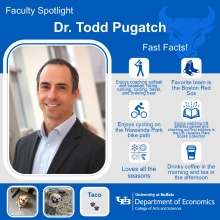Faculty Spotlight - Todd Pugatch
Dr. Todd Pugatch is an applied microeconomist with research interests in the economics of education, development economics, and labor economics. He received his PhD in Economics from the University of Michigan. You can find him teaching Economic Development (ECO 416/516), Current Economic Problems (ECO 212), and Economics of Education (ECO 796)!

Dr. Todd Pugatch
Why did you choose economics? Why did you choose your subfield?
TP: I took my first economics class in high school. Around the same time, I was becoming increasingly aware of the dramatic income disparities across communities in my home state, Massachusetts. The high school economics class included a module on international development, which introduced me to the same concept on a global scale. I learned that the puzzle of why some places are rich and others poor is one of the oldest questions in economics. This started me on the path of studying development and education economics.
What research are you working on right now?
TP: Lots of projects, probably too many! One example is an evaluation of a performance-based financing program for schools in Cameroon. Schools can earn additional government funds if they meet a set of performance indicators, on things like not excluding students for failing to pay fees, student attendance, and teachers making lesson plans. We randomly assign schools to different types of bonuses they can qualify for, allowing us to test how these incentives affect student learning and other outcomes.
What was your favorite paper to write, and why?
TP: Someone once asked Tom Brady what his favorite championship was. He said, “The next one.” That’s how I feel about papers. Research is exciting. Chasing the next idea and writing about it is the biggest thrill.
What is your favorite class to teach and why?
TP: I like teaching all my classes, but my favorite is ECO796: Economics of Education. It’s a PhD seminar, where we read and discuss classic and frontier research in economics of education. It lets me revisit seminal papers in the field and discover the newest and best research in this area.
What was your favorite class as an undergrad?
TP: Labor economics. Most of my research concerns human capital, a concept I first encountered in that class. I later taught undergrad labor economics using the same textbook.
What is your top piece of advice for your students?
TP: Persevere. Economics involves seemingly simple concepts, but internalizing and applying these concepts is hard. It’s worth the effort.